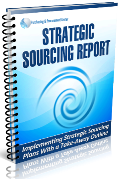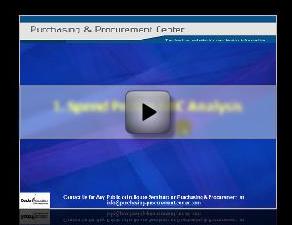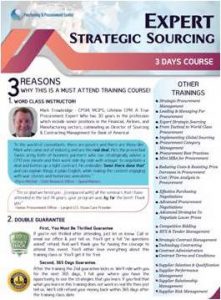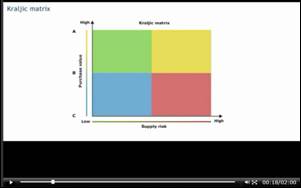25 Skills for Procurement Specialist Professionals

Acquiring the correct skills for procurement specialists plays a crucial role in ensuring that organizations obtain the best products at the right price.
In this guide, we highlight 25 key skills that can help procurement specialists succeed and create immense value.
Check Out: Practical & Real-Life Procurement Training Courses
Why a Procurement Strategy Is Crucial for Business Success
1. Negotiation Skills
Negotiation is a crucial skill for any procurement specialist. Being able to negotiate favorable terms with suppliers can lead to cost savings, better delivery schedules, and improved supplier relationships.
Effective negotiation requires a deep understanding of the value you're getting from suppliers and a good strategy to secure the best deal for your organization.
2. Strategic Sourcing
Strategic sourcing involves the careful planning and execution of procurement activities to align with the organization's goals.
By considering factors beyond price, such as quality, reliability, and sustainability, procurement specialists can make more informed decisions that contribute to long-term success.
Read More: STRATEGIC SOURCING TRAINING
3. Market Research and Analysis
A good procurement specialist needs to keep up with market trends and competition. Doing detailed market research helps find potential suppliers, predict costs, and understand the supply chain.
By analyzing market data, you can make informed decisions based on up-to-date information.
4. Contract Management
Procurement specialists must be skilled at managing contracts. This includes drafting, reviewing, negotiating, and ensuring compliance with contractual terms.
Strong contract management helps prevent disputes, optimize costs, and ensure that both parties fulfill their obligations.
5. Financial Acumen
Understanding financial concepts is essential for making sound purchasing decisions. Procurement professionals must manage budgets, calculate cost savings, assess total cost of ownership (TCO), and perform return-on-investment (ROI) analysis to ensure their decisions align with the company’s financial goals.
6. Supplier Relationship Management
Building and maintaining strong relationships with suppliers is vital. Supplier relationship management (SRM) is not just about negotiating terms but also about cultivating trust and collaboration. Effective SRM leads to better deals, improved supply chain reliability, and opportunities for innovation.
7. Communication Skills
Procurement specialists need excellent communication skills to interact with suppliers, internal stakeholders, and management. Clear communication ensures that everyone is on the same page regarding expectations, requirements, and objectives.
Whether in meetings, reports, or emails, effective communication is key to successful procurement.
8. Risk Management
Understanding and managing risks is essential in procurement. Risks can come in many forms, from supplier disruptions to currency fluctuations.
By identifying potential risks early and creating mitigation strategies, procurement specialists can minimize negative impacts on the business.
Read More: 7 Best Procurement Practices
9. Technical Proficiency in Procurement Tools
Its important for procurement professionals to be familiar with a variety of procurement software and tools. These tools help streamline processes, track purchases, manage supplier data, and generate reports. Being tech-savvy enhances efficiency and reduces errors in procurement operations.
10. Problem-Solving Skills
Procurement specialists often encounter challenges that require quick thinking and creativity. Whether it’s dealing with a supply chain disruption or finding an alternative supplier, strong problem-solving skills are essential to keeping procurement activities running smoothly.
11. Data Analysis Skills
Procurement specialists need to be proficient in analyzing large volumes of data to make informed decisions. This includes analyzing supplier performance, evaluating purchasing patterns, and using data to forecast demand and optimize procurement strategies.
Read More: Top 3 Best Procurement Certifications
12. Attention to Detail
A small oversight in procurement can result in major consequences. Procurement specialists must have a keen eye for detail to ensure contracts, invoices, and product specifications are accurate, reducing the risk of costly errors.
13. Leadership and Management Skills
Procurement professionals often manage teams or work with cross-functional teams. Strong leadership skills, such as decision-making, team motivation, and conflict resolution, are important to ensure that procurement processes are efficiently executed.
14. Ethical Sourcing
Ethical sourcing involves selecting suppliers who follow ethical and sustainable practices. Procurement specialists must ensure that their organization is committed to ethical sourcing by evaluating the social and environmental impact of their suppliers’ operations.
You Might Also Like COST REDUCTION IN PURCHASING & PROCUREMENT!
15. Knowledge of Procurement Laws and Regulations
Procurement specialists must be well-versed in the legal aspects of procurement, including contract law, trade regulations, and compliance requirements. Keeping up with changes in the law ensures that procurement activities are legally sound and risk-free.
16. Forecasting and Demand Planning
Accurate demand forecasting is essential for ensuring that the right quantity of goods or services is available at the right time. Procurement specialists must use historical data, market trends, and supplier performance metrics to predict future needs.
Check Out: The 7 Core Purchasing Strategies!
17. Time Management Skills
Procurement professionals often juggle multiple tasks and projects simultaneously. Good time management skills ensure that procurement activities are completed on time and in line with deadlines, helping to keep operations running smoothly.
18. Negotiating Payment Terms
Negotiating favorable payment terms with suppliers can improve cash flow and reduce financial stress for your organization. A procurement specialist should be adept at balancing short-term financial needs with long-term supplier relationships.
19. Customer Service Orientation
Procurement professionals must keep the needs of their internal customers in mind. Whether it's ensuring that the right product is sourced or managing expectations with stakeholders, a strong customer service mindset is crucial to meeting the demands of the organization.
20. Supplier Performance Evaluation
Tracking and assessing supplier performance is an ongoing task for procurement specialists. By regularly evaluating key performance indicators (KPIs), procurement specialists ensure that suppliers meet expectations and contractual obligations, leading to better value and quality.
Check out these practical and recognized certifications to level up your logistics skills here.
21. Global Sourcing Expertise
Procurement professionals need to source products and services from all over the world. This requires understanding international trade rules and logistics and the ability to evaluate suppliers from different countries.
22. Adaptability and Flexibility
The procurement field is always changing. Successful procurement specialists must be adaptable and able to respond to shifts in market conditions, supplier performance, and the organization's needs.
23. Vendor Risk Management
Procurement specialists must manage not only the financial aspects of supplier relationships but also the risks associated with relying on third-party vendors. This includes assessing vendors' financial stability, reputation, and operational reliability.
Read More: Explore how CIPM certifications prepare you for real-world scenarios.
24. Sustainability Practices
Sustainability is becoming increasingly important in procurement. Procurement specialists must be aware of how sourcing decisions impact the environment and seek out suppliers that prioritize sustainable practices and products.
25. Collaboration Skills
Procurement specialists often work with various departments within an organization, such as finance, legal, and operations. Strong collaboration skills are necessary for ensuring that procurement aligns with broader organizational objectives and goals.
Explore Procurement Certifications
If you want to build expertise and strengthen your procurement career, obtaining certifications can greatly enhance your skills and credibility.
Explore procurement certification programs and gain advanced knowledge to excel in your procurement career today: Learn More.
Frequently Asked Questions (FAQs)
1. What are the most important skills for a procurement specialist?
1. What are the most important skills for a procurement specialist?
The most important skills include negotiation, strategic sourcing, contract management, market analysis, financial acumen, and supplier relationship management.
2. How can I improve my procurement skills?
2. How can I improve my procurement skills?
You can improve your procurement skills by gaining certifications, attending relevant workshops, staying up to date with industry trends, and practicing negotiation and supplier management.
3. What certifications are recommended for procurement professionals?
3. What certifications are recommended for procurement professionals?
Certifications like CIPP and CIPM are highly recognized and can help professionals enhance their procurement expertise, boost credibility, and open doors to advanced career opportunities.
4. How can procurement specialists ensure ethical sourcing?
4. How can procurement specialists ensure ethical sourcing?
Procurement specialists can ensure ethical sourcing by thoroughly vetting suppliers, considering environmental and social impacts, and requiring suppliers to comply with ethical standards.
Written by Lindsay Chesar (Education Director), Edited by Artin Vaqari (CEO Purchasing & Procurement Center), Updated by Azmi Anees









